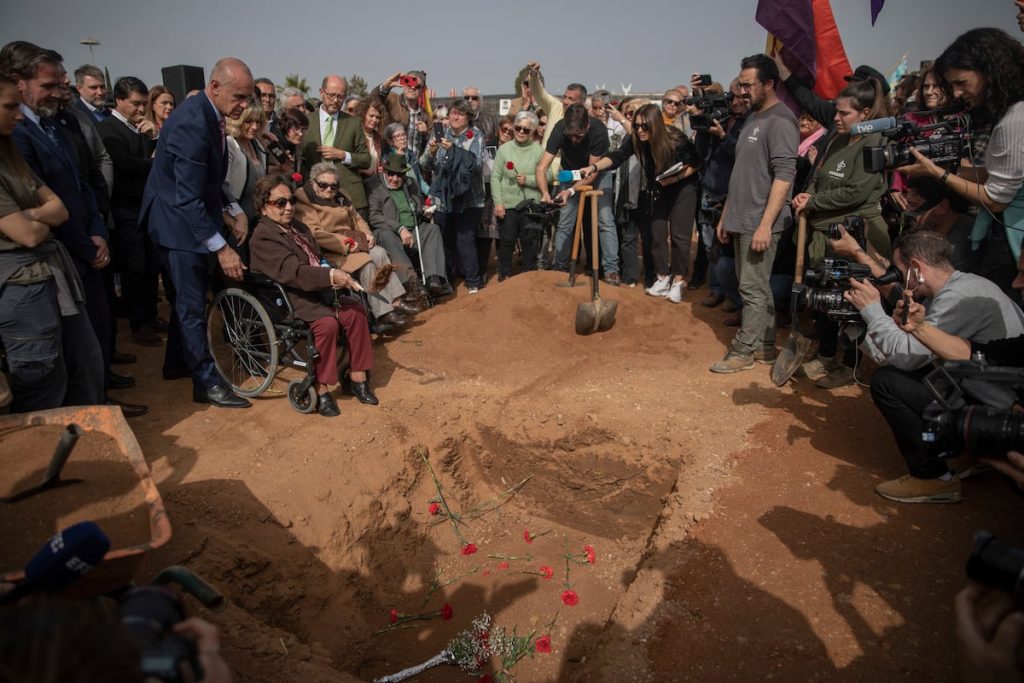The Minister of Territorial Policy and Democratic Memory, Ángel Víctor Torres, chaired the Territorial Council of Memory on Thursday, which was attended by representatives from all autonomous communities, including those that have recently repealed their regional memory laws or plan to replace them with others called “conciliation” laws. During the meeting, it was approved the distribution of three million euros this year for the autonomous communities to continue with the exhumation of the remains of those repressed during the Franco regime, as well as for dissemination tasks related to repression and dignification of the victims, as the State’s general budgets are being extended. On the other hand, the ministry has reminded the City Council of Madrid, led by the PP mayor José Luis Martínez-Almeida, that it must stop its project to build a waste center in the Montecarmelo neighborhood if it is confirmed that there is a mass grave beneath the ground. Andalusia, where the PP governs with an absolute majority, is the community that receives the most money (521,198 euros) from the approved budget today, due to the high number of graves and remains already exhumed or pending exhumation in that region. They are followed by Catalonia (419,856 euros), Castilla-La Mancha (307,874 euros), and the Valencian Community (289,327 euros). The latter is one of the three communities whose bipartite governments of PP and Vox have decided to repeal the regional memory laws.
Aragon, the first community to which the central government has taken to the Constitutional Court for this reason, will receive 89,827 euros from the ministry. During the meeting this morning, the conflict in the court of guarantees was not addressed. Nor was another controversy between the central and municipal administrations addressed – this time, the City Council of Madrid (PP) – on a matter related to democratic memory: the possibility that there is a mass grave with the remains of nearly 400 international brigades of the civil war in a place where the Madrid City Council intends to build a mega-canton for garbage trucks. Asked about this after the meeting, the Secretary of State for Democratic Memory, Fernando Martínez, described the negotiations, so far unsuccessful, with the City Council led by Martínez-Almeida: “We have again requested authorization to carry out archaeological excavations [they had already hired a specialized company for 17,000 euros] to know for sure whether or not there are human remains in the vicinity of the Fuencarral cemetery. The initial request was denied.”
The Secretary of State explained that the City Council has also not handed over the report commissioned by the local corporation, on its own, to another company, despite knowing that it has been ready “since April.” “The studies tell us that the brigades may be in that place where the City Council intends to build a waste canton, but obviously, if there is a mass grave there, they cannot touch that area,” Martínez emphasized. Asked about the Government’s options in that regard, the Secretary of State replied: “Destroying a mass grave is illegal. And the entity with competences on this matter is the State Secretary of Democratic Memory.” Regarding what he described as “delay tactics” by the City Council to deny the specialists hired by the Government access to the area, the high-ranking official of the central government insisted: “Sooner or later, we are going to do it. When a bone comes out and it is certified that there are corpses there, they must be exhumed.”.
The regional councilors were also informed on Thursday about the imminent launch of the DNA database for exhumed remains, following the acquisition of the Bonaparte software program, developed by the Dutch Forensic Institute and commonly used by Interpol. The system will allow storing genetic profiles to conduct systematic searches based on human remains from mass graves, and compare them with those of relatives who have been searching for the missing from the civil war and dictatorship for years.


